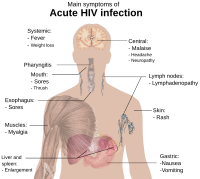
Photo from wikipedia
Objective To investigate the effects of the training of aerobic function on clinical symptoms and quality of life in patients with medium and advanced lung cancer. Methods The study objects… Click to show full abstract
Objective To investigate the effects of the training of aerobic function on clinical symptoms and quality of life in patients with medium and advanced lung cancer. Methods The study objects were 84 patients with medium and advanced lung cancer who were treated in our hospital (July 2019–July 2021) and their materials were retrospectively reviewed. Depending on the different intervention modes, they were equally divided into control group (routine nursing intervention measures) and experiment group (training of aerobic function), with 42 cases in each group. The clinical symptoms and living quality were compared between the two groups. Results After intervention, affective meaning, behavior/severity, cognitive/mood, and sensory scores in both groups were decreased, and the various indexes in the experiment group were lower compared with the control group (P < 0.05). After intervention, the patients' clinical symptoms, such as pain, inappetence, insomnia, and dyspnea in the two groups were improved, and the experiment group achieved eminently better improvement compared with the control group (P < 0.05). After intervention, the walking distances in 6 minute walk test (6MWT) in both groups were increased, and the experiment group achieved observably longer walking distance compared with the control group (P < 0.05). After intervention, the patients' pulmonary function indexes of forced vital capacity (FVC), forced expiratory volume in 1s (FEV1), and FEV1/FVC% level in the two groups were all improved, and the experiment group had signally better indexes compared with the control group (P < 0.05). After intervention, the patients' scores of Quality of Life Questionnaire-Core Questionnaire (QLQ-C30) in both groups were decreased, and the experiment group achieved much lower score compared with the control group (P < 0.05). Conclusion The training of aerobic function has obvious therapeutic effect on medium and advanced lung cancer. This training can mitigate the patients' cancer-related fatigue and clinical symptoms, improve their pulmonary function, and enhance their athletic ability and quality of life.
Journal Title: Journal of Healthcare Engineering
Year Published: 2022
Link to full text (if available)
Share on Social Media: Sign Up to like & get
recommendations!